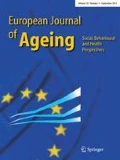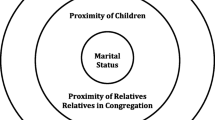Abstract
The associations between prevalence, incidence and recovery from activities of daily living (ADL) disability and social ties among community-dwelling persons over 65 in Finland, The Netherlands and Spain are examined. Data were harmonized in the CLESA study. The baseline sample was composed of 3,648 subjects between 65 and 85 years old, living in Finland, The Netherlands and Spain. Disability in four activities of daily living was determined at baseline and at follow-up. Social participation, number of family ties and presence of friends were added to obtain a social ties index. Logistic regressions were fitted to the prevalence, incidence and recovery data to estimate the associations between disability and social ties, adjusting for education, co-morbidity and self-rated health. The modifying effects of country, age and sex were tested in all models. For every country, the social ties index, having friends and social participation were negatively associated with ADL disability prevalence. ADL incidence was negatively related to the number of family ties, with a stronger relationship in Spain than in The Netherlands or Finland. ADL recovery was associated with the social ties index. No age or gender differences in these associations were found. Social ties appear to generate a beneficial effect on the maintenance and restoration of ADL function. While social ties play an important role in maintaining and restoring function in all three countries, family ties appear to generate a stronger effect on protection from disability incidence than does social participation, and the strength of this effect varies by culture.
Similar content being viewed by others
References
Avlund K, Lund R, Holstein BE, Due P, Sakari-Rantala R, Heikkinen R-L (2004a) The impact of structural and functional characteristics of social relations as determinants of functional decline. J Gerontol Soc Sci 59:44–51
Avlund K, Lund R, Holstein BE, Due P (2004b) Social relations as determinant of onset of disability in aging. Arch Gerontol Geriatr 38:85–99
Bassuk SS, Glass TA, Berkman LF (1999) Social disengagement and incident cognitive decline in community dwelling elderly persons. Ann Intern Med 131:165–173
Béland F, Zunzunegui MV (1999) Predictors of functional status in a population of community-dwelling elderly in Spain. Age Aging 28:153–159
Berkman LF, Glass T, Brissette I, Seeman TE (2000) From social integration to health: Durkheim in the new millennium. Soc Sci Med 51:843–857
Berkman LF, Melchior M, Chastang J, Niedhammer I, Leclerc A, Goldberg M (2004) Social integration and mortality: a prospective study of French employers of electricity of France-Gas of France: the GAZEL cohort. Am J Epidemiol 159:167–174
Bisschop MI, Kriegsman DMW, Van Tilburg T, Penninx BWJH, van Eijk JTM, Deeg DJH (2003) The influence of differing social ties on decline in physical functioning among older people with and without chronic diseases. Aging Clin Exp Res 15:164–173
Cerhan JR, Wallace RB (1993) Predictors of decline in social relationships in the rural elderly. Am J Epidemiol 137:870–880
Cohen S, Doyle WJ, Skinner DP, Rabin BS, Gwaltney JM (1997) Social ties and susceptibility to the common cold. JAMA 24:1940–1944
Deeg DJ, van Tilburg T, Smit JH, de Leeuw ED (2002) Attrition in the Longitudinal Aging Study Amsterdam: the effect of differential inclusion in side studies. J Clin Epidemiol 55(4):319–328
Fabrigoule C, Letteneur L, Dartigues JF, Zarrouk M, Commenges D, Barbeger-Gateau P (1995) Social and leisure activities and risk of dementia: a prospective longitudinal study. J Am Geriatr Soc 43:485–490
Glass TA, Mendes de Leon C, Seeman TE, Berkman LF (1997) Beyond single indicators of social networks: a LISREL analysis of social ties among the elderly. Soc Sci Med 44:1503–1517
Glass TA, Mendes de Leon CF, Marottoli RA et al. (1999) Population based study of social and productive activities as predictors of survival among elderly Americans. BMJ 319:478–483
Grundy E, Slogett A (2003) Health inequalities in the older population: the role of personal capital, social resources and socioeconomic circumstances. Soc Sci Med 56:935–947
House JS, Landis KR, Umberson D (1988) Social relationships and health. Science 241:540–545
Jylhä M, Jokela J, Tolvanen E, Heikkinen E, Heikkinen RL, Koskinen S, Leskinen E, Lyyra AL, Pohjolainen P (1992) The Tampere Longitudinal Study on Ageing. Description of the study. Basic results on health and functional ability. Scand J Soc Med Suppl 47:1–58
Liu X, Liang J, Muramatsu N, Sugisawa H (1995) Transitions in functional status and active life expectancy among older people in Japan. J Gerontol Soc Sci 50B:S383–S394
Mendes de Leon CF, Glass TA, Beckett LA, Seeman TE, Evans DA, Berkman LF (1999) Social networks and disability transitions across eight intervals of yearly data in the New Haven EPESE. J Gerontol Ser B Psychol Sci Soc Sci 54:S162–S172
Mendes de Leon CF, Gold DT, Glass TA, Kaplan L, George LK (2001) Disability as a function of social networks and support in elderly African Americans and whites: the Duke EPESE 1896–1992. J Gerontol Ser B Psychol Sci Soc Sci 56:S179–S190
Mendes de Leon CF, Glass TA, Berkman LF (2003) Social engagement and disability in a community population of older people. The New Haven EPESE. Am J Epidemiol 157:633–642
Minicuci N, Noale M, Bardage C, Blumstein T, Deeg DJH, Gindin J, Jylhä M, Nikula S, Otero A, Pedersen NL, Pluijm SMF, Zunzunegui MV, Maggi S, CLESA Working Group (2003) Cross-national determinants of quality of life from six longitudinal studies on aging: the CLESA project. Aging Clin Exp Res 15:187–202
Peek MK, Ottenbacher KJ, Markides KS, Ostir GV (2003) Examining the disablement process among older Mexican American adults. Soc Sci Med 57:413–425
Pluijm SMF, Bardage C, Nikula S, Blumstein T, Jylha M, Minicuci N, Zunzunegui MV, Pedersen NL, Deeg DJH, for the CLESA Study Working Group (2005) Harmonising a measure of ADL disability across six countries. J Clin Epidemiol (in press)
Sagy S, Antonovsky H (2000) The development of the sense of coherence: a retrospective study of early life experiences in the family. Int J Aging Hum Develop 51:155–166
Seeman T (1996) Social ties and health: the benefits of social integration. Ann Epidemiol 6:95–106
Seeman TE, Berkman LF (1998) Structural characteristics of social networks and their relations with social support in the elderly: who provides support? Soc Sci Med 26:737–749
Seeman TE, Berkman LF, Kohout F, Lacroix A, Blazer D (1993) Intercommunity variations in the association between social ties and mortality in the elderly: a comparative analysis of three communities. Ann Epidemiol 3:325–335
Turner RJ, Marino F (1994) Social support and social structure: a descriptive epidemiology. J Health Soc Behav 35:193–212
Unger JB, Johnson CA, Marks G (1997) Functional decline in the elderly: evidence for direct and stress-buffering protective effects of social interactions and physical health. Ann Behav Med 19:152–160
Unger JB, McAvay G, Bruce ML, Berkman L, Seeman T (1999) Variation in the impact of social networks characteristics on physical functioning in elderly persons. McArthur Study of Successful Aging. J Gerontol 54:S245–S251
Valderrama-Gama E, Damian J, Ruigomez A, Martin Moreno JM (2002) Chronic disease, functional status, and self-ascribed causes of disabilities among noninstitutionalized older people in Spain. J Gerontol Med Sci 57A:M716–M721
Verghese J, Lipton RB, Katz MJ, Hall CB, Derby CA, Kuslansky G et al. (2003) Leisure activity and the risk of dementia in the elderly. New Eng J Med 348:2508–2516
Wilkins K (2003) Social support and mortality of the Canadian older population. Health Rep 14:23–37
Zunzunegui MV, Béland F, Gutierrez-Cuadra P (2001a) Loss to follow up in a longitudinal study of a community dwelling elderly population. J Clin Epidemiol 54:501–510
Zunzunegui MV, Béland F, Otero A (2001b) Support from children, living arrangements, self-rated health and depression of the elderly in Spain. Int J Epidemiol 30:1090–1099
Zunzunegui MV, Alvarado BE, Del Ser T, Otero A (2003) Social networks, social integration and social engagement are risk factors for cognitive deterioration among Spanish elderly. J Gerontol Ser B Psychol Sci Soc Sci 58:S93–S100
Zunzunegui MV, Koné A, Johri M, Béland F, Wolfson C, Bergman H (2004) Social networks and self-reported health in two French-speaking Canadian community-dwelling populations over 65. Soc Sci Med 58:2069–2081
Acknowledgements
The CLESA Working Group: Finland M. Jylhä (Principal Investigator), S. Nikula, V. Autio; Israel J. Gindin (Principal Investigator; First Principal Investigator—the late Modan Baruch of the Chaim Sheba Medical Center), T. Blumstein, A. Chetrit, A. Walter-Ginzburg, K. Shamay; Italy S. Maggi (Project Leader), N. Minicuci, M. Noale, C. Marzari; The Netherlands D.J.H. Deeg (Principal Investigator), S.M.F. Pluijm; Spain A. Otero (Principal Investigator), M.J. Garcia de Yebenes, A. Rodríguez-Laso, M.V. Zunzunegui; Sweden N.L. Pedersen (Principal Investigator), C. Bardage. The CLESA Project is supported by EU QoL2000-00664. LASA is supported by The Netherlands Ministry of Health, Welfare and Sports and the Vrije Universiteit. ILSA was supported by the CNR (National Research Council) and the Italian Department of Health–National Institutes of Health. Aging in Leganés is supported by the Spanish Health Research Fund (FIS), the Madrid Regional Research Fund and Private Foundations (La Caixa, BBVA). CALAS was supported by the US National Institute on Aging Grants R01-5885-03 and R01-5885-06. The TamELSA is supported by the Academy of Finland, the Juho Vainio Foundation, the Yrjö Jahnsson Foundation and the Medical Research Fund of Tampere University Hospital. SATSA is supported by the US National Institute on Aging (AG 04563, 10175) and the Swedish Social Research Council.
Author information
Authors and Affiliations
Consortia
Corresponding author
Rights and permissions
About this article
Cite this article
Zunzunegui, M.V., Rodriguez-Laso, A., Otero, A. et al. Disability and social ties: comparative findings of the CLESA study. Eur J Ageing 2, 40–47 (2005). https://doi.org/10.1007/s10433-005-0021-x
Published:
Issue Date:
DOI: https://doi.org/10.1007/s10433-005-0021-x



